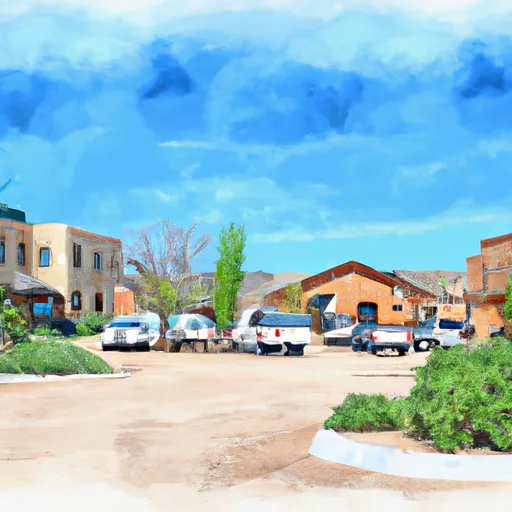-
 Snoflo Premium
Snoflo Premium
Get unlimited access to all our content
With no Ad interruptions! - Start Your Free Trial Login with existing account
Mc-Neal
Eden Index
Climate
9.0
•
Recreation
1.4
•
Community
•
Safeguard
4.1/10

Mc-Neal, Arizona, located in Cochise County, is a small unincorporated community with a population of around 300 people. The region experiences a desert climate, characterized by hot summers and mild winters. Summers in Mc-Neal are hot and dry, with temperatures frequently exceeding 100°F (38°C), while winters are relatively mild, with temperatures ranging from 40°F (4°C) to 70°F (21°C).
The hydrology constituents in Mc-Neal include the San Pedro River, which runs nearby and provides a vital water source for the area's diverse flora and fauna. The river is also a key habitat for various bird species, making it a popular destination for birdwatching enthusiasts.
Outdoor recreation opportunities in Mc-Neal are abundant. The area offers access to vast stretches of natural landscapes, allowing for activities such as hiking, camping, and wildlife observation. The nearby Coronado National Forest is a favorite spot for nature lovers, offering numerous trails and camping sites. Additionally, the San Pedro Riparian National Conservation Area is a great place for birdwatching, with the chance to spot over 350 different bird species.
Overall, Mc-Neal, Arizona, is a small desert community with a unique climate, access to the San Pedro River, and a variety of outdoor recreation opportunities, making it an appealing destination for those seeking to explore and connect with nature.
What is the Eden Index?
The Snoflo Eden Index serves as a comprehensive rating system for regions, evaluating their desirability through a holistic assessment of climate health, outdoor recreation opportunities, and natural disaster risk, acknowledging the profound impact of these factors on livability and well-being.
Climate Health Indicator (CHI): 9.0
Mc-Neal receives approximately
301mm of rain per year,
with humidity levels near 53%
and air temperatures averaging around
17°C.
Mc-Neal has a plant hardyness factor of
8, meaning
plants and agriculture in this region tend to thrive here all year round.
By considering the ideal temperature range, reliable water supplies, clean air, and stable seasonal rain or snowpacks, the Climate Health Indicator (CHI) underscores the significance of a healthy climate as the foundation for quality living.
A healthy climate is paramount for ensuring a high quality of life and livability in a region, fostering both physical well-being and environmental harmony. This can be characterized by ideal temperatures, reliable access to water supplies, clean air, and consistent seasonal rain or snowpacks.
Weather Forecast
Streamflow Conditions
Rio De Bavispe
Area Rivers
Rio De Bavispe
Snowpack Depths
Rio De Bavispe
Reservoir Storage Capacity
Rio De Bavispe
Groundwater Levels
Recreational Opportunity Index (ROI): 1.4
The Recreational Opportunity Index (ROI) recognizes the value of outdoor recreational options, such as parks, hiking trails, camping sites, and fishing spots, while acknowledging that climate plays a pivotal role in ensuring the comfort and consistency of these experiences.
Access to outdoor recreational opportunities, encompassing activities such as parks, hiking, camping, and fishing, is crucial for overall well-being, and the climate plays a pivotal role in enabling and enhancing these experiences, ensuring that individuals can engage in nature-based activities comfortably and consistently.
Camping Areas
| Campground | Campsites | Reservations | Toilets | Showers | Elevation |
|---|---|---|---|---|---|
| Whitewater Draw Dispersed | None | 4,065 ft |
Nearby Ski Areas
Catastrophe Safeguard Index (CSI):
The Catastrophe Safeguard Index (CSI) recognizes that natural disaster risk, encompassing floods, fires, hurricanes, and tornadoes, can drastically affect safety and the overall appeal of an area.
The level of natural disaster risk in a region significantly affects safety and the overall livability, with climate change amplifying these risks by potentially increasing the frequency and intensity of events like floods, fires, hurricanes, and tornadoes, thereby posing substantial challenges to community resilience and well-being.
Community Resilience Indicator (CRI):
The Community Resilience Indicator (CRI) recognizes that education, healthcare, and socioeconomics are crucial to the well-being of a region. The CRI acknowledges the profound impact of these elements on residents' overall quality of life. By evaluating educational resources, healthcare accessibility, and economic inclusivity, the index captures the essential aspects that contribute to a thriving community, fostering resident satisfaction, equity, and social cohesion.

